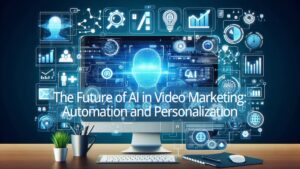|
Getting your Trinity Audio player ready...
|

In the ever-evolving realm of SEO, the integration of artificial intelligence (AI) has revolutionized content creation and optimization strategies. However, as AI becomes increasingly sophisticated, questions regarding the authenticity and ethical implications of AI-generated content have surfaced. It’s crucial to recognize AI as a powerful tool to augment human creativity and expertise rather than a substitute for it entirely. Ensuring the ethical and effective use of AI-generated content requires a thoughtful approach that prioritizes authenticity, transparency, and adherence to ethical guidelines.
Content Optimization: AI-powered tools like SurferSEO or Clearscope analyze content against top-performing pages for a given keyword and suggest improvements. For example, if you’re writing a blog post about “best budget smartphones,” these tools can recommend including specific subtopics, adjusting keyword density, or improving readability to match the content quality of top-ranking pages.
Keyword Research: Tools like SEMrush or Ahrefs leverage AI to analyze search data and suggest relevant keywords. For instance, if you’re optimizing a website for a pet grooming business, AI algorithms might recommend targeting long-tail keywords like “best dog grooming services in [city]” based on search volume and competition analysis.
Natural Language Processing (NLP): Google’s BERT algorithm is a prime example of NLP in action. It understands the context of search queries to deliver more relevant results. When optimizing content, focus on answering user queries naturally. For instance, instead of stuffing keywords, provide comprehensive answers to common questions related to your topic.
User Experience (UX) Optimization: AI-powered tools like Google Analytics and Hotjar analyze user behavior to identify areas for improvement. For example, if users frequently exit your site after visiting a particular page, AI can suggest redesigning the layout or adding more engaging content to reduce bounce rates.
Technical SEO: Tools like Screaming Frog or DeepCrawl use AI to crawl websites and identify technical issues. For instance, they can detect broken links, duplicate content, or pages with slow loading times. By fixing these issues, you can improve your site’s crawlability and visibility in search results.
Voice Search Optimization: AI assistants like Siri, Alexa, and Google Assistant rely on NLP to understand voice queries. When optimizing for voice search, focus on conversational keywords and natural language. For example, instead of targeting short-tail keywords like “pizza delivery,” optimize for longer phrases like “where can I find the best pizza delivery near me?”
Predictive Analytics: Tools like Moz or BuzzSumo use AI to analyze historical data and predict future trends. For instance, they can identify emerging topics in your industry or predict changes in search algorithms. By staying ahead of trends, you can adjust your SEO strategy accordingly and maintain a competitive edge.
Image and Video SEO: AI-powered tools like TinEye or Google Vision API analyze images and videos to improve search visibility. For instance, they can generate alt text for images or transcribe video content for better indexing. By optimizing multimedia elements, you can enhance your overall SEO performance.
Elements Worth Considering:
- Case Studies and Success Stories: Include real-life examples of businesses or individuals who have successfully implemented AI-powered SEO strategies.
- Expert Interviews: Conduct interviews with industry experts or professionals who specialize in AI and SEO.
- Interactive Elements: Incorporate quizzes, polls, or surveys to encourage reader participation.
- Visual Content: Include infographics, charts, or videos to complement the text.
- User-generated Content: Encourage readers to share their own AI-powered SEO success stories.
- Trending Topics: Explore emerging trends related to AI and SEO.
- Practical Tips and How-to Guides: Provide actionable advice on integrating AI into SEO content creation.
Finally: The integration of AI into SEO content creation offers immense potential to streamline processes, enhance efficiency, and drive meaningful results. However, it’s essential to maintain a steadfast commitment to ethical principles and best practices. By prioritizing authenticity, transparency, and continuous learning, businesses can navigate the complex landscape of AI-generated content with integrity and authenticity. Ultimately, striking the right balance between AI-driven automation and human creativity will empower organizations to achieve sustainable growth and success in the digital age.




